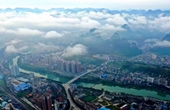Seeds planted in Five-Year-Plan pay off for Hechi's farmers
By (chinadaily.com.cn)
2016-02-26
The rural per capita net income of Hechi in Guangxi has almost doubled over a five-year period, according to government reports.
The city has seen an impressive rate of growth in its rural economy in recent years with an income per capita increase from 3,599 yuan ($550.65) in 2010 to 6,104 yuan in 2015, an average annual growth of 11.35 percent.
The year of 2015 was the last year of the 12th Five-Year Plan and during the five-year period, the Hechi government strove to deepen rural reform and develop modern agriculture.
In the five years, the city vigorously adjusted agricultural production structures and transformed the development model for farming. The government focused on projects aimed at upgrading the production of silkworm, sugarcane, vegetables, fruit, mushrooms, leisure agriculture and selenium-rich agricultural product industries.
Up to now, the city's area of mulberry fields has been 806,800 mu (about 53,787 hectares) with an annual output reaching 110,000 tons; The cultivated area of sugarcane has reached 930,000 mu with annual output of 3.54 million tons; With a planting area of 873,000 mu, fruits can generate an annual output value of one billion yuan; The cultivated areas of vegetables and edible fungus have reached 1.22 million mu and 7.53 million square meters respectively.
The Hechi government also took steps to develop leisure agricultural tourism to further broaden farmers' income channels. With 11 newly established modern agricultural demonstration areas attracting more than four million tourists annually, Hechi has gained 1.3 billion yuan in income from agricultural tourism within a year.
Additionally, industries to support the poor have also become major routes for Hechi farmers to increase their incomes nowadays.
Edited by Owen Fishwick




